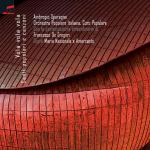

SPARAGNA Ambrogio, DE GREGORI Francesco
Vola, vola, vola
MPR 039 CD
8015948304143
Parco della Musica Records
Italia
Vola, vola, vola
MPR 039 CD
World Music
8015948304143
Parco della Musica Records
Italia
The album Vola, vola, vola was born from the encounter between Ambrogio SPARAGNA, one of the most important musicians of latest Italian folk music, and Francesco DE GREGORI, one of the most famous Italian singer-songwriters known as «Il principe dei cantautori» ("The prince of the singer-songwriters") for the elegance of his lyrics.
In Vola, vola, vola, Ambrogio SPARAGNA and Francesco DE GREGORI explore the great heritage of traditional Italian folk music, rediscovered and refreshed with the Orchestra Popolare Italiana. Moreover Francesco De Gregori has chosen some of his songs to be rearranged in a new folk way by Sparagna: La ragazza e la miniera, Ipercarmela, Santa Lucia, Babbo in prigione and San Lorenzo.
The album Vola, vola, vola was born from the encounter between Ambrogio SPARAGNA, one of the most important musicians of latest Italian folk music, and Francesco DE GREGORI, one of the most famous Italian singer-songwriters known as «Il principe dei cantautori» ("The prince of the singer-songwriters") for the elegance of his lyrics.
In Vola, vola, vola, Ambrogio SPARAGNA and Francesco DE GREGORI explore the great heritage of traditional Italian folk music, rediscovered and refreshed with the Orchestra Popolare Italiana. Moreover Francesco De Gregori has chosen some of his songs to be rearranged in a new folk way by Sparagna: La ragazza e la miniera, Ipercarmela, Santa Lucia, Babbo in prigione and San Lorenzo.
Born in 1957 Ambrogio SPARAGNA studied ethnomusicology at the University of Rome with Diego Carpitella with which he made several survey campaigns on Italian folk music. In 1976 he founded the first school of rural folk music in Italy at the Circolo Gianni Bosio in Rome where in 1984 he founded the Bosio Big Band, an unique orchestra of accordions. In 1995 he wrote the musical La via dei Romei, which had among its protagonists Francesco De Gregori in the role of storyteller and which was presented at the Grand Prix Italia '96. From 2004 to 2006 he was the conductor of La Notte della Taranta Festival, where he founded a large orchestra of sixty folk musicians (Orchestra Popolare della Notte della Taranta). With this orchestra he performed several concerts in Italy and abroad. In the summer of 2007 he founded the Orchestra Popolare Italiana of Auditorium Parco della Musica in Rome, a great ensemble to promote the repertoire of Italian folk music.
Francesco DE GREGORI was born in Rome in 1951. Influenced by Bob Dylan, Leonard Cohen and the Italian singer-songwriter Fabrizio de André, De Gregori started to perform his own songs at the Folkstudio in Rome and made his debut as a professional singer in 1972. In 1975 he released one of the most successful Italian LPs of the 1970s, Rimmel. His next albums (Bufalo Bill, De Gregori, Viva l’Italia) confirmed his qualities as singer-songwriter and featured successful songs.
After a pause of several years, De Gregori returned in the 80s with other successful albums (Titanic, La donna cannone, Scacchi e tarocchi). Il fischio del vapore, released in 2002, was a collaboration with the folksinger Giovanna Marini and is a collection of old popular and social Italian songs from the 19th and the early 20th centuries.

Francesco De Gregori - vocals
Maria Nazionale - vocals
Amarcanto - vocals
Ambrogio Sparagna - vocals, diatonic accordion, conduction

Our Playlist
Our olaylist on Spotify, dedicated to P
re Minimalism, Minimalism and Post Minimalism.
© 2025 Felmay Srl - P.I. 06974300011 | Powered by: Riccardo Marino























